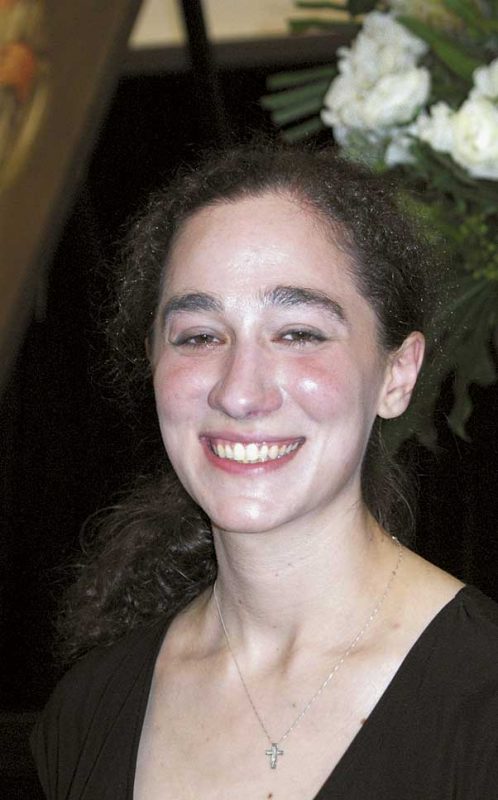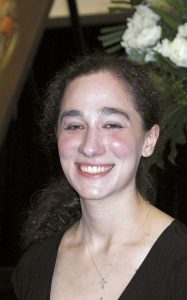by ROWENA OREJANA
Leah Libresco’s search for God, although she did not know she was looking for him and whose existence she denied, went through a winding road of deontology, virtue ethics, geometry, topology and even Broadway musicals.
She grew up in an atheist household in a Jewish community in New York. She recalls a friend in a high school European history class asking the teacher, “Do Lutherans still exist today?”
The answer, fortunately for Leah, is yes, as it was in a discussion with a Lutheran friend
that she realised there is a God.
“When the Holy Spirit came down on the apostles they found themselves speaking tongues they
themselves didn’t understand, so that God’s Word, and God’s love, could go out to every people,” she said. The 24-year-old convert spoke at the Eucharistic Convention in Auckland on April 11.
“In my own mind, God reached out to me speaking the language I understood, which wasn’t really
English so much as math, weird bits of philosophy and some of the Broadway musicals,” she said.
Miss Libresco said her intellectual path to conversion came about when she met other Christian
mathematicians in college. “They were my kind of people, except Christian,” she said.
She was in a debating group and thought it wouldn’t be a waste of time to prove them wrong. She exchanged books with them and read works by C. S. Lewis, G. K. Chesterton and Fyodor Dostoevsky.
As a believer of deontology, a rule-based philosophical system, morality to her was like a ruler that should not be bent by mercy or compassion. Her favourite character in Les Miserables was Javert, who “loved morality too much to believe in mercy”.
As she went through college, she found deontology insupportable and switched to virtue ethics
as her morality.
“Virtue ethics wants you to be a nice person, to make the kind of choices that are ethical easily and naturally. It doesn’t look at being easy and natural as weakness,” she explained.
She found a book that encapsulated what she believed and gave her friend a copy of After Virtue by Alisdair MacIntyre.
“My friend said, ‘You know Alisdair MacIntyre converted into Catholicism, right? You know he
didn’t think that that system held up?,’” she said. “And I said some words that I wouldn’t repeat before this very dignified body.”
Miss Libresco continued her search for truth through virtue ethics. She explained she held pieces of the truth like a jigsaw puzzle that she couldn’t put together.
“Here was the hardest part of virtue ethics for me: your best self, this teleological self, this you that you are aiming for, where does it come from?”she said.
“Luckily, I had some finer tools to help me along because teleological self and virtue ethics weren’t the first transcendental systems that I encountered. I already really, really liked math. And math is kind of the one transcendental thing that everyone agrees is transcendental,”
she said.
One does not make mathematical theorems, one uncovers them. The theorems are already there, in
the same way that transcendental moral issues are already there.
Again, she ran into trouble. It was easier to work out mathematical problems than moral ones,
although one has an intuitive sense of both. It was easier to solve equations than to judge the gradations of injustice.
She said she also had a sense of her conscience. She didn’t know where it came from or how
it worked. “It will be crazy to say, ‘I don’t believe my eyes because I don’t know what they do’. It will be crazy now to say ‘I don’t believe my conscience because I don’t know
what it does’,” she said.
She was searching for the truth in the pieces of her puzzle while she was studying Catholicism to debunk it.
She talked to priests, who would listen patiently about mathematics and geometry until she circled around her belief in virtue ethics. She finished college firmly denying the existence of God.
She later met her debating group and found the points she was making made her sound Catholic.
“I thought that was weird. I resembled them, but a kind of a parallel thing. And it kind of
kept bothering me,” she said, “because I had this impulse to convert but hadn’t had anything to
base it on but a feeling. But it’s not helpful at all.”
She grabbed a friend who was, ironically, “a Lutheran — they do exist!” and explained her arguments about deontology, virtue ethics, transcendental truths of geometry and morality, still not accepting God.
“He said, ‘Okay, your problem is you have a transcendental knowledge of morality. And you don’t have a satisfactory answer of what it is. All right, what do you think the answer is?’”
When she tried to go over her explanations again, he stopped her.
“You have to try throwing new things in the problem, not just going over again and again
what you’ve already discarded,” he said.
“Oh, I don’t know, I guess, morality just loves me or something,” she blurted out.
She said that’s when she knew this transcendental knowledge of ethics is not coming from within her, but from outside. “And that was the conversion of my intellect, where God built up all the different tools I needed to see him at that moment.”
Now, she said, her task is a conversion of the heart. All those mistakes led her to learn a
new language. “I have the opportunity to study it, a language of love and mercy and mercy that isn’t powerless even,” she said.


This is so beautiful, Leah (and Rowena)! Thank you for sharing! God sought you out with His great love and mercy! Have you read Redeeming Math by Dr. Vern Poythress? I’m sure he would agree with you about your points about math and how God speaks through it! I’m listening to your interview now on Side B with Jana (this is April 2023). That’s how I found this!
May the Lord continue to be glorified through your life that shines brightly for Him.